The vast majority of U.S. adults agree that religion’s influence in public life is shrinking, and most of them see this as a bad thing. Americans generally express a positive view of religion in the new survey. There also is a growing sense that people’s own religious beliefs conflict with the society in which they live, and that religious disagreements are best not talked about.
- 48% say there is a “great deal” of conflict or “some” conflict between their own religious beliefs and mainstream American culture, up from 42% who said this in 2020.
- 29% say they think of themselves as part of a minority group because of their religious beliefs, up from 24% in 2020.
- 41% say that when they disagree with someone about religion, the best thing to do is to avoid discussing religion at all, up from 33% who said this in 2019.
Most Jewish Americans and religiously unaffiliated Americans think conservative Christians have gone too far in trying to impose their religious values on the government and public schools. Most Christians, by contrast, think secular liberals have gone too far in trying to keep religion out of the government and public schools.
All told, the survey results show that many Americans are discontented with religion’s trajectory in American life.
Is religion gaining or losing influence in American life?
Today, 80% of U.S. adults say religion is losing influence in American life. That is up 6 percentage points from 2022, and is as high as it’s been since we started asking questions like this in 2001.
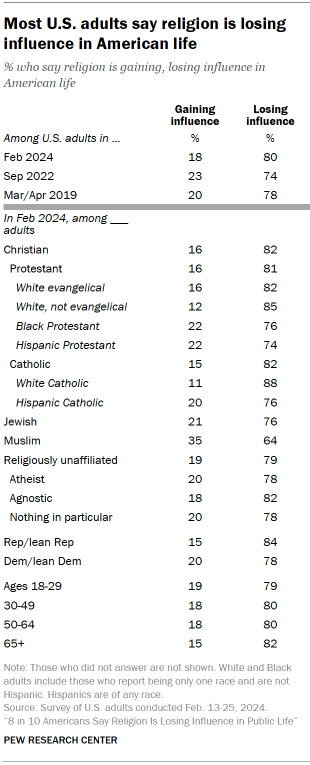
Majorities in every religious group we analyzed agree that religion’s influence in public life is shrinking, as do most Republicans and Democrats, and most across age groups.
Just 18% of U.S. adults say religion is gaining influence.
Is religion’s changing trajectory a good thing or bad thing?
After asking respondents whether they think religion is gaining or losing influence in American life, we posed a follow-up question: Is this a good thing or a bad thing?
Roughly half of respondents (49%) say religion is losing influence and that this is bad for society, while 8% say religion is gaining influence and this is good for society. Taken together, this means 57% express a positive view of religion’s impact – a larger share than we found in 2019 and 2022.2
Far fewer express a negative view of religion by saying either that its influence is shrinking and this is good (13%) or by saying its influence is growing and this is bad (6%). About one-in-five adults (21%) say that it doesn’t make much difference whether religion’s influence on American life is growing or shrinking.
Most Christians express a positive view of religion’s impact on American life, saying either that its influence is declining and this is bad (64%) or that its influence is growing and this is good (11%).
Most atheists and agnostics, by contrast, express a negative view of religion’s influence in American society. Jews and people who describe their religion as “nothing in particular” are divided between those who have a positive view of religion, those who have a negative view, and those who say changes in religion’s influence don’t make much of a difference.
Republicans and those who lean toward the Republican Party are far more likely than Democrats and Democratic leaners to express a positive view of religion by these measures. And older American adults are far more positive toward religion than younger Americans.
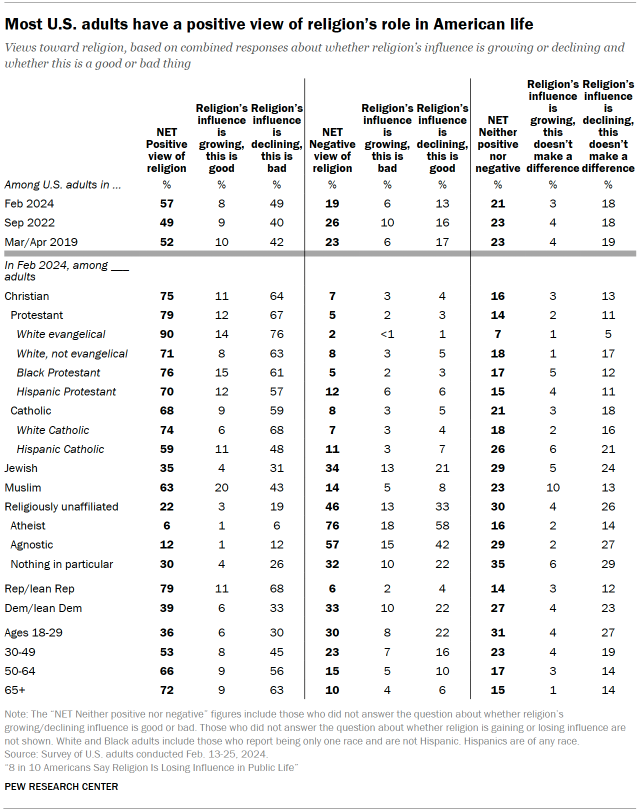
Do Americans feel at odds with society because of their religion?
Today, 29% of U.S. adults say they think of themselves as part of a minority group because of their religious beliefs. This figure is up modestly since 2020, when 24% said this.

Most Jewish Americans (83%) and many Muslim Americans (55%) say they think of themselves as a minority because of their religious beliefs, as do 44% of atheists.
But many Christians also say their religious beliefs make them a minority in the U.S., including 38% of Hispanic Protestants, 37% of White evangelical Protestants, and 25% each among Catholics and Black Protestants.
The new survey also finds that about half of U.S. adults (48%) say there is “a great deal” of or “some” conflict between their own religious beliefs and mainstream American culture, up from 42% who said this when the Center last asked in 2020.
Clear majorities among White evangelicals (71%), Jews (59%) and atheists (59%) hold this view. Smaller but still substantial numbers in other groups sense a conflict between their religious beliefs and the values of the prevailing culture.
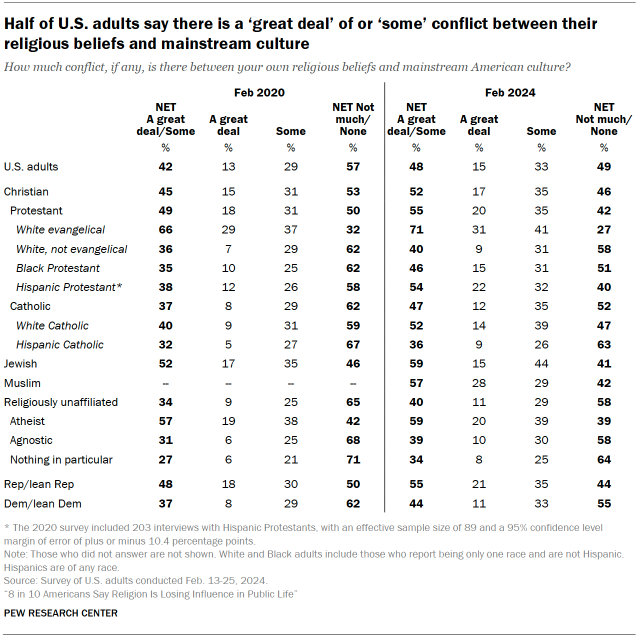
Have some Americans gone too far trying to control religion in the government and schools?
Half of U.S. adults say they think secular liberals have gone too far in trying to keep religion out of the government and public schools. This view is especially common among White evangelical Protestants (83%). But most Catholics – particularly White Catholics – agree, as do 62% of Hispanic Protestants, 58% of White nonevangelical Protestants and 52% of Black Protestants.
Meanwhile, in response to a separate question, roughly half of U.S. adults say they think conservative Christians have gone too far in trying to push their religious values in the government and public schools. Fully 91% of atheists express this view, as do 85% of agnostics and 76% of Jewish Americans.
Three-quarters of Republicans and Republican leaners say liberals who are not religious have gone too far trying to remove religion from government and public schools. A similar share of Democrats and Democratic leaners say conservative Christians have gone too far in the other direction.
Older adults are more apt than younger Americans to say secular liberals have gone too far in trying to keep religion out of the government and schools. Younger adults, by contrast, are far more likely than older Americans to say conservative Christians have gone too far in trying to impose their religion in the government and public schools.
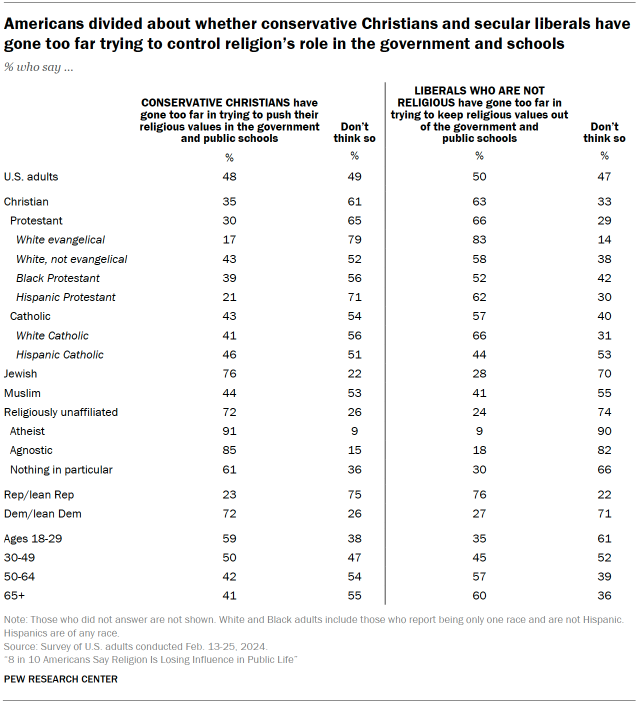
When these two questions are combined, the data shows that:
- 17% of U.S. adults think both sides – conservative Christians and secular liberals – have gone too far trying to control religion in the government and public schools.
- 31% think conservative Christians have gone too far, but secular liberals have not.
- 33% think secular liberals, but not conservative Christians, have gone too far.
- 19% don’t think either group has gone too far.
What do conservative Christians and secular liberals think about these questions?
The survey makes it possible to look at how conservative Christians and secular liberals themselves answer these questions. To do this, we combined information from two questions – one that asks respondents about their religious identity, and another that asks about their “political views” – to examine the views of conservative Christians and secular liberals.
Among respondents in this survey, 27% identify religiously as Christian and also describe themselves, politically, as conservative. These are “conservative Christians.”
Meanwhile, 12% of respondents identify as religiously unaffiliated, and also describe their political views as liberal. These are “secular liberals.” (Six-in-ten respondents don’t fall into either category; they are neither conservative Christians nor secular liberals.)
This analysis found that:
- 73% of conservative Christians say secular liberals have gone too far trying to keep religion out of the government and schools, and don’t say their own side has gone too far in the other direction.
- 88% of secular liberals say conservative Christians have gone too far trying to impose their religion in the government and schools, and don’t say their own side has gone too far in the other direction.
Among the majority of the public that doesn’t fall into either camp, opinions are much more divided: 32% say conservative Christians (but not secular liberals) have gone too far and 21% say secular liberals (but not conservative Christians) have gone too far. Meanwhile, 22% say both sides have gone too far, and 25% don’t say that either side has gone too far.
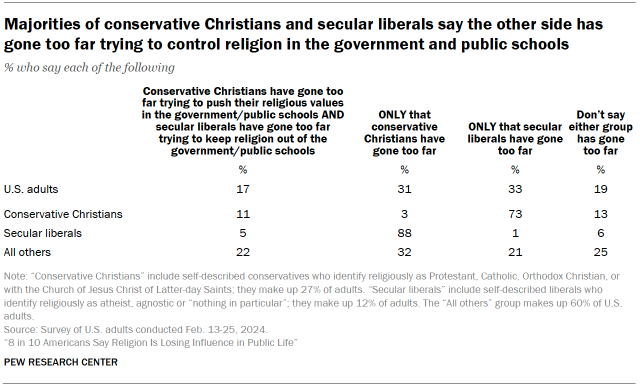
What should people do when they disagree about religion or politics?
Here’s what U.S. adults say when asked what they think is the best way to proceed when someone disagrees with them about religion:
- 41% say it’s best to just avoid discussing religion altogether, up from 33% who said this in 2019.
- 53% say it’s best to try and understand the other person’s perspective and agree to disagree, down from 62% who said this in 2019.
- Just 5% say the best approach is to try and persuade the other person to change their mind. This is virtually unchanged since 2019.
There is relatively little appetite for trying to change someone’s mind about religion among any of the religious groups analyzed in the survey, peaking at just 14% among White evangelical Protestants.
The survey finds a similar pattern in opinions about how to proceed in the face of political disagreements. Roughly half say it’s best to try to understand the other person’s political perspective and agree to disagree, and 45% say politics is best avoided in the face of disagreement. Just 5% say the best approach is to try to change the other person’s political view.
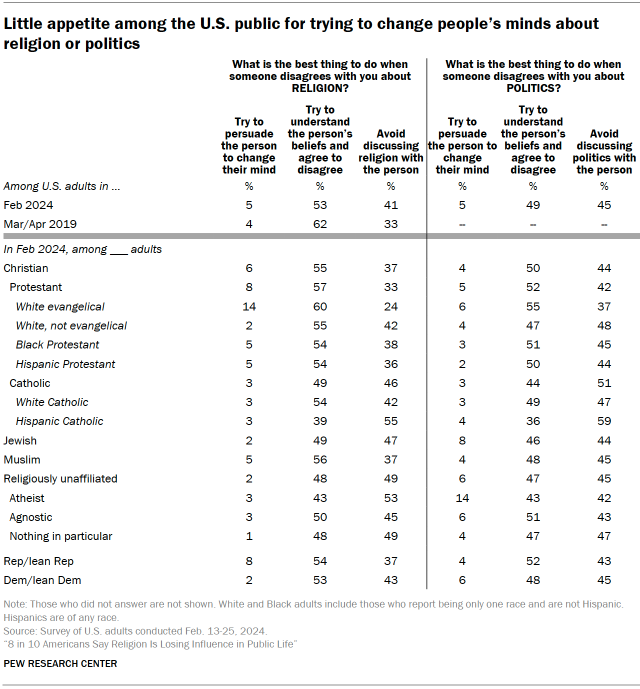
How friendly to religion are Democrats, Republicans, the Biden administration and the Supreme Court?
About half of U.S. adults say they think the GOP is “friendly” toward religion. This is 7 points lower than when we last asked this question in 2022, but higher than the share who say the Democratic Party is friendly toward religion.
The GOP is seen as friendly toward religion by 60% of Republicans and Republican-leaning independents, and by large numbers within Republican-majority religious groups, including 61% of White evangelical Protestants and 55% of White Catholics.
The GOP is also seen as friendly toward religion by many Democrats and Democratic leaners (47%), and by large numbers of people within some largely Democratic religious groups, including 80% of atheists, 68% of agnostics and 55% of Jews.
This feeling is decidedly not mutual. Most Republicans and Republican leaners say they think the Democratic Party is “unfriendly” toward religion. For their part, 53% of Democrats and Democratic-leaning independents say the Democratic Party is “neutral” toward religion, while 37% say it is friendly toward religion and just 8% say it is unfriendly.
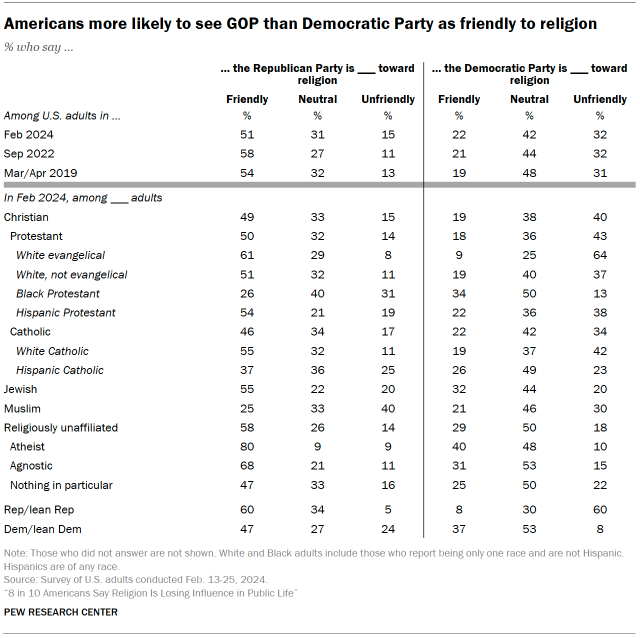
Views about the Biden administration’s approach to religion resemble views about the Democratic Party. Democrats and Democratic leaners mostly say the Biden administration is neutral or friendly toward religion, while Republicans and Republican leaners mostly say the Biden administration is unfriendly to religion.
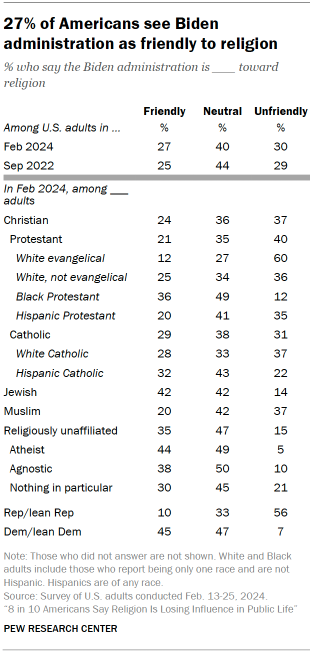
Following the Supreme Court’s decision in June 2022 that overturned Roe v. Wade and ended federal protections for abortion, the share of Americans saying they viewed the Court as friendly to religion increased sharply – from 18% in spring 2019 to 35% in September 2022. In the new survey, the share saying the court is friendly to religion ticked down to 28%.
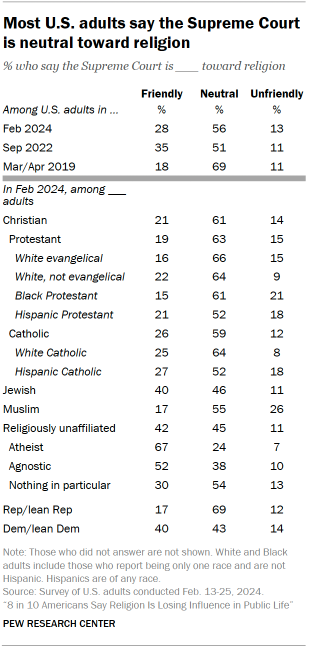
Most Republicans and Republican leaners say the Supreme Court is neutral toward religion. Democrats and Democratic leaners, by contrast, are more evenly split between those who say it is neutral and those who think the court is friendly toward religion.
Relatively few people in either party think the Supreme Court is unfriendly to religion.




